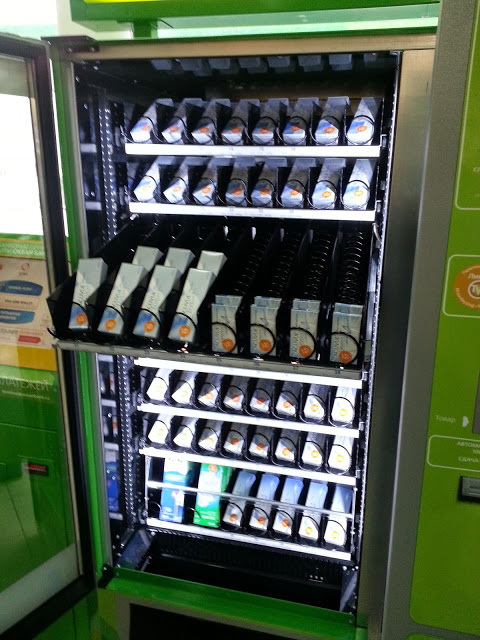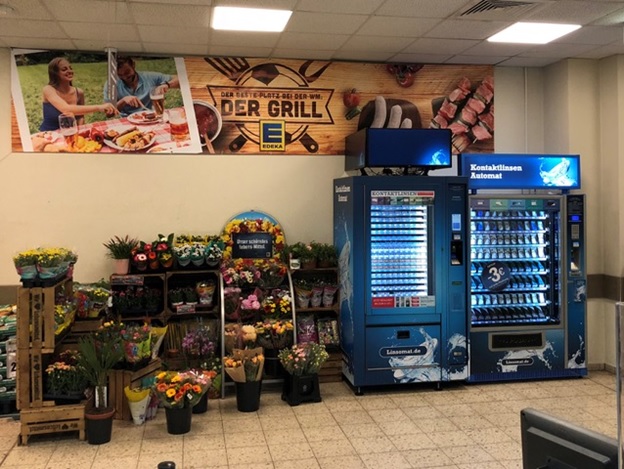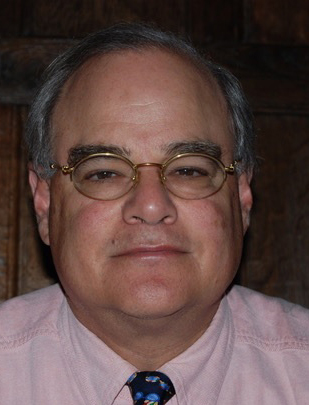By Edward Dean Butler

August 22, 2018
A debate rages among U.S. optometrists over telehealth, remote Rx checks and greater access to health care and optical goods, such as contact lenses.
The best way to compete with the new players in our industry–the disrupters–may be to think globally. I have been living for some time in the UK, and have noticed that we could take a lesson in optometry from the rest of the world. We would do well to look outside our insular boarders at how most of the world is wrestling with — and in many cases has resolved — these very issues.
Here are five cues we should consider taking from other countries in how we provide access to care and optical products.

Contact lenses sold in a vending machine in Russia. The public increasingly expects ease of purchase of contact lenses.
Access & Fees
In the UK, about 30 percent of the population receives a “free” eye exam and basic eyeglasses paid for by the National Health Service. This includes full-time students, “old age pensioners” (horrible term) and anyone with a family history of glaucoma, diabetes and certain other diseases. In the UK, if you do not qualify for the freebie, you pay for your eye examination (“sight test” in UK parlance) and your eyeglasses/contact lenses. There is almost no such thing as optical insurance in the UK. VSP tried, but got almost nowhere with UK employers.
In the UK, the National Health Service reimburses optometrists £21.31 ($28.33) for a comprehensive eye exam, a statutory exam essentially the same as in most of the U.S. The large chains generally subsidize the eye exam by charging £10 ($13.30). The average price of a pair of glasses is about $220. Thus, volume is the key to earning a good living as a UK optometrist.
Training & Accreditation
Some nations (such as France) scarcely have optometrists — just ophthalmologists, and they do not practice in optical stores. You first go to an ophthalmologist of your choice in France. Optical retailers are not even permitted to recommend an ophthalmologist, just hand you a list of those nearby.
By the way, the most rigorous optometry training program in the world is (believe it or not) in the Philippines (where optometrists use the title Doctor of Optometry). The Philippine program is six years of formal training and includes thorough training and practical experience in lens technology, lens processing and dispensing. In the Philippines, optometrists also must be able to operate most lab equipment and dispense.
Then there are many nations, such as most of Asia, where there is no formal qualification to be an optometrist. Most have learned “on the job” working under someone experienced. Most focus on producing a useful Rx and only basic health care. For example, in India, most “optometrists” do not have tonometers, but most can detect elevated pressures by applanation (of thumbs on eyelids). Cataracts are detected via ophthalmoscope, at best — but this works reasonably well. On the other hand, ophthalmology in India is among the most advanced in the world. The same is true for Russia. Many ophthalmologists with broad international experience will say both India and Russia are ahead of the U.S. in ophthalmology!

A vending machine selling contact lenses in Germany. Contact lens sales have increasingly become more casual, and less regulated, in Europe.
Contact Lens Dispensing
Moving to contact lenses: this is an interesting subject in Europe. In 25 of the 28 European Union nations, contact lenses are totally deregulated. This started in Germany nearly 20 years ago when the German government got fed up with the fact that only specially qualified optometrists were permitted to prescribe contact lenses. The eventual result was total deregulation. In most of Europe, a consumer can buy whatever contact lenses they want in a drug store or online.
Is this good or bad? You decide, but here are the facts. In northern Europe where the deregulation started, contact lenses are now about 30 percent of corrective lenses sold — versus 6-7 percent 20 years ago. In Finland, the figure is over 40 percent. The contact lens manufacturers are not moaning about this! They quietly love it.
Compliance
Compliance has improved. Europe is primarily a daily lens market, and compliance has improved significantly with the easy availability of contact lenses. Consumers buy one or two boxes at a time. In Russia, Poland, Belarus and parts of Germany, contact lenses are sold via vending machines — one box at a time. The contact lens manufacturers compete with each other to be represented in the vending machines and offer the vending people special offers to be displayed on the vending machines.
What about eye health? I am sure some of you are thinking incidence of eye infections and corneal problems must have increased in Europe after deregulation. Not so! There have supposedly been studies in Germany and in Sweden. I have been told about these but have never seen them. They were never published, apparently because the incidence of problems decreased–apparently due to improved compliance.
Yes, a contact lens wearer in Europe can try different brands and even different powers. But, most people do visit a professional periodically to be sure they are wearing the correct product. And, eye exams are far less expensive in Europe than in the U.S.
In the UK, there is a regulation that contact lenses cannot be purchased without a valid Rx. But the authorities (General Optical Council) have chosen not to enforce the regulation. The largest UK online contact lens seller (VisionDirect.co.uk, owned by Essilor) gives you a choice regarding “verification” of your Rx. You can ask Vision Direct to verify the Rx with your professional or you can “self certify” your Rx. If you choose verification via your provider, you are warned this entails a three-day delay in processing! Try it yourself. Go to VisionDirect.co.uk and go through the process. Vision Direct sells all the major brands, but they are working hard to induce customers to switch to their own Taiwan-produced private label (EverClear). Customers receive this inducement after their first purchase.
Hubble has been in the UK since last February. They are already processing 12,000 orders per month. Hubble has a local competitor called Waldo Contacts (founded by a very sharp woman who is a Harvard University MBA). And, Specsavers, with about 50 percent of the UK market, sells essentially only their own private label. No wonder Essilor’s VisionDirect.co.uk is promoting their own private label.
Access to Medications
What about medicine in general in the UK? Pharmacists in the UK can prescribe about 80 percent of all medications. You do not have to visit a medical doctor first in most cases — just speak with your local pharmacist. And all medications are the same price — a £8.80 ($11.70) “dispensing fee.” If you are a student, on government “support” or over 60 (like me) you are exempt from the dispensing fee! If you need to see a medical doctor, you phone the day you want to see the doctor. In the 25 years I have been in the UK, I have always seen a doctor on the day I phoned for an appointment. (Horror tales we hear in the U.S. are “fake news.”)
Is all this good or bad? Is U.S. optometry under threat? My point of view is that U.S. optometry will survive just fine if eyes are open, and if U.S. optometry simply accepts changes that are inevitable — and stops trying to resist the inevitable.
 Edward Dean Butler was a marketing executive at Procter & Gamble for 14 years before helping a colleague found what is now Vision Works. He then founded LensCrafters, with the famous “glasses in about an hour” slogan. After five years at LensCrafters Mr. Butler left to found Vision Express in the UK and Australia. Today he serves on several Boards of Directors, including Neurolenses in the USA and Eyoto (ophthalmic instruments) in the UK. To contact him: edeanbutler@gmail.com
Edward Dean Butler was a marketing executive at Procter & Gamble for 14 years before helping a colleague found what is now Vision Works. He then founded LensCrafters, with the famous “glasses in about an hour” slogan. After five years at LensCrafters Mr. Butler left to found Vision Express in the UK and Australia. Today he serves on several Boards of Directors, including Neurolenses in the USA and Eyoto (ophthalmic instruments) in the UK. To contact him: edeanbutler@gmail.com



























